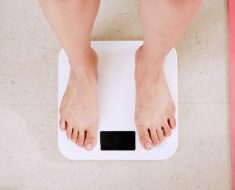In this article, we look at how IUDs work and whether they can cause weight gain. We also discuss the safety and effectiveness of IUDs, their pros and cons, alternative methods of contraception, and general tips on weight management.
What is an IUD?

An intrauterine device (IUD) is a long-term method of contraception. This small device sits inside the womb, preventing pregnancy by stopping sperm from getting to an egg and fertilizing it.
There are two main kinds of IUD:
- Non-hormonal. Also known as a copper IUD, the copper in the device kills sperm before it reaches the egg. It can be used as emergency contraception and lasts for up to 10 years.
- Hormonal. This IUD releases a hormone that causes the mucus in the cervix to thicken. This stops sperm from reaching an egg. It can take a week to start working and remains effective for 3 to 5 years.
A nurse or doctor inserts the IUD through the vagina and into the uterus. This is a quick and easy procedure that does not need an anesthetic.
However, the insertion of the IUD may cause some pain, cramping, or dizziness. The medical practitioner may offer the person medication before the procedure to help with this.
A non-hormonal IUD begins protecting against pregnancy immediately. A hormonal IUD protects against pregnancy from 7 days after insertion.
IUDs and weight gain
The medical community has not done enough scientific research into whether IUDs cause weight gain. Existing studies do not show a clear link between contraceptive use and weight gain.
This is a difficult area to study because researchers would need to compare a large group of people using the IUD to a large group using a placebo. A placebo looks exactly like the real thing but does not do anything. Researchers use placebos to test medication.
Understandably, many people do not want to take part in a long-term study using birth control that does not protect against pregnancy.
Some people have reported gaining weight from using a hormonal contraceptive, while others report losing weight. Consequently, many hormonal contraceptives list both weight gain and weight loss as possible side effects.
Researchers generally agree that it is unlikely that hormonal contraceptives lead to significant weight gain. As people age, they often gradually gain weight. A person may link their weight gain to contraceptive use, but it could be down to a natural increase in body fat or muscle.
Everyone is different. There is a delicate balance of hormones in the body, and anything that affects them can cause noticeable changes.
Some research suggests that getting married or moving in with a partner may be linked to weight gain. These life events may coincide with starting to use an IUD.
Of course, people who are single, not married, or not living with a partner also use IUDs. These people may also report weight gain, and researchers need to carry out more studies on possible links between weight gain and relationship status.

The IUD is more than 99 percent effective at preventing pregnancy. This means that if 100 people used an IUD over 1 year, less than one would become pregnant.
Other forms of contraception are often less effective because people can make errors when using them; for example, by forgetting to take a birth control pill or not putting a condom on correctly.
The IUD does not protect against sexually transmitted infections (STIs). A person may wish to use an additional method of contraception, such as a condom, to protect against STIs.
There is a possibility that an IUD can cause an infection in the pelvis, which may happen if bacteria enter the uterus during insertion of the IUD.
Symptoms of a pelvic infection include pain, cramping, and soreness in the lower part of the belly. A person may also have a fever, feel cold, or have difficulty breathing. Anyone experiencing these symptoms should seek medical advice as the infection will usually need treatment.
It is possible but unlikely for an IUD to slip out. If the IUD does come out, a person should use another form of birth control until they can see a doctor.
An IUD can pierce the wall of the uterus, although this is very unlikely. If the IUD does penetrate the wall, it can be quite painful and cause increased bleeding. A doctor may need to remove the IUD surgically.

Putting on some weight is often a natural part of aging. But gaining a lot of weight can have an impact on health and wellbeing. The Centers for Disease Control and Prevention (CDC) have a body mass index calculator that can help a person to find out if they are a healthy weight.
Maintaining a healthy weight works best through long-term changes to diet and lifestyle. Some tips on a healthful lifestyle include:
- eating only the amount of calories recommended for a person’s sex and activity level
- including plenty of fruits, vegetables, and whole grains in the diet
- choosing low-fat or fat-free dairy options
- avoiding or cutting down on saturated fats, added salt, and sugar
- choosing lean meat, fish, beans, eggs, and nuts as a protein source
- taking regular exercise
The CDC recommend that each week people should aim to do:
- around 150 minutes of moderate exercise, such as brisk walking or cycling at a casual pace
- about 75 minutes of vigorous activity, such as jogging, swimming, or competitive sports
Takeaway
IUDs are a safe and effective method of contraception. Studies have not shown a clear link between contraceptive use and weight gain, but more research is needed.
There are many different forms of birth control, each with their pros and cons. If a person is unhappy or has concerns about their current method of contraception, they should speak to their doctor to discuss alternative options.
Source: Read Full Article





